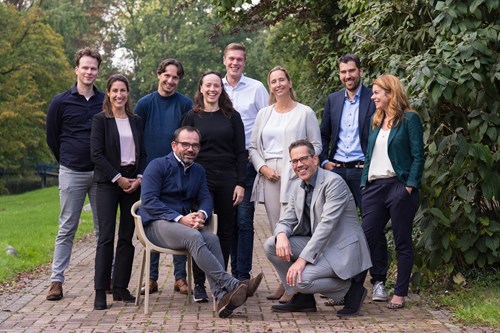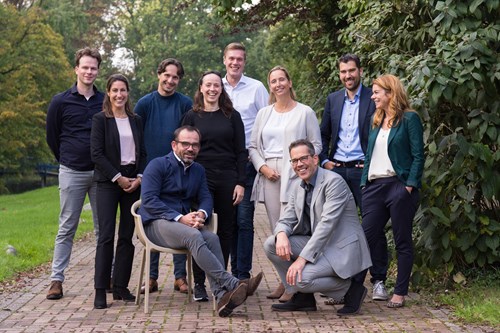A shared vision
Who do we want to be as insurers? It's a big question that also includes big challenges. Especially if we strive for a sustainable, circular economy. How do you do that and what role can (or should?) the insurance industry play? Ten sustainability and investment specialists from insurers have recently looked into this question. The result is an easy-to-read vision that should inspire insurers to make a major contribution to the world of tomorrow now.
The vision, i.e. no fixed policy (yet), describes the way in which insurers can contribute to the transformation from the current, unsustainable, linear economy to a sustainable, circular economy. And that vision starts, logically, with inspiring images of the world in 2040 and the question of what role insurers can already play in the transformation around five themes.
From possession to use
The first theme is the transition from possession to use. If people do not want to own goods, but only want to use them when they need them, then that also has major consequences for insurance products. Do current insurance products facilitate such a transition or do they form a blockage? Secondly, the financial impact is discussed: the capital of insurers is used to enable sustainable transformations in order to create a positive impact.
According to Dennis Heijnen, policy advisor at the Association and one of the participants, the following follow-up question is the most interesting: "Does exclusion policy of one company lead to a real change in companies and society or is it simply financed by someone else? In other words, what is the real-world impact of insurance companies' capital?"
Three more transformations
According to Heijnen, Transformation three focuses on the importance of healthy and vital people who are also valued in the right way in society. "With the follow-up question: how can insurers already encourage people and organizations to make other choices in order to drastically reduce the costs of the healthcare system?"
Another transformation is that everyone contributes to the collective use of data and thereby helps prevent damage. With the follow-up question to be answered: is the current data system aimed at prevention or repair of damage? And to what extent is there cooperation? Heijnen: "And last but not least: laws and regulations have long been seen in 2040 as an important means to determine and increase the impact of everyone's actions. In order to keep the playing field fair and sustainable."
If we can achieve that in 2040, then we have done very well, according to him. "Many companies experience laws and regulations as a major burden. Both in time, administration and money," heijnen explains. "To what extent are we able to make such a change in thinking so that we see laws and regulations as an opportunity to make more impact?"
Current rules determine outcomes
After a description of the inspiring images and stimulating questions, the reader gets a glimpse into the current rules of the game. Because, according to Heijnen, it is precisely these rules that determine everything for the outcomes you get. "Unfortunately, we have to conclude that if we continue on the path we have taken together, we will face even greater crises." He sums up: global warming, loss of biodiversity, raw material shortages, food issues, inequality in the world, high healthcare costs and burnout figures. Dennis: "It shows that not only the Netherlands, but the earth and we are exhausting ourselves as people. The current systems we live in are not future-proof." A gloomy picture at the beginning of the year. Fortunately, Dennis, together with the nine other specialists, has listed various options to turn the tide.
Impact Program 2021: Who do we want to be?

During the Impact Program 2021, the ten specialists from different insurers, led by Professor André Nijhof (Nyenrode) and Alexander de Bruin (I Will Power), searched for the answer to the question that concerns everyone: how do we contribute to a sustainable transformation of the insurance sector? With the aim of a joint strategy on how insurers can accelerate this transformation.
Impact Paper
The joint strategy can be found in the delivered report: Who do we want to be as insurers? Impact paper on how the insurance industry can play a crucial role in accelerating sustainable transformations in society.
"The current systems we live in are not future-proof"
Laws and regulations
In order to achieve sustainable acceleration, you need to make an inventory of what is already happening and on which foundations you can continue to build. There have already been important developments in the use of capital and the products and services of insurers and the impulse that comes from Europe.
Heijnen highlights the latter: "A very important development that will give the transformation a major boost is the new laws and regulations from Europe. They are going to change the rules of the game considerably."
According to him, this game changer will be the most important pillar for the strategic choices for the insurance sector. "However," he emphasizes, "changing the rules of the game is not something that only comes from 'Europe' or 'The Hague'. Insurers in particular can play an important stimulating and guiding role in sustainable transformations with their insurance products and investment choices."
The cockpit of insurers
The Impact Paper zooms in on this so-called 'cockpit of insurers'. The paper and the appendix describe various ways in which insurance companies can use their capital and products to test their impact against the transformations." Dennis mentions a few. "Take the One more round principle: many insurance products are aimed at maintaining the existing. The customer will be compensated for the damage by the same repaired or new product. This one more round principle does not really contribute to transformation."
Another example. The Behavioural Principle: with the help of the behavioural principle, you can make customers aware of the consequences of a choice on the basis of data. And you can then entice that customer to make a more sustainable choice with certain advantages in policy conditions. As a result, the risks for the customer and for society are reduced and the negative impact is limited. A concrete example of the latter principle emerged during the Youth Innovation Programme 2021, where research showed that people opt for partial restoration of a wooden floor when they realise how much trees and CO2 emissions they experience.
It's all about purpose and impact
A crucial success factor for creating the most impact is collaboration. Cooperation within an insurance company, but also with other companies, for example in the field of sustainable damage repair. This means that you no longer throw away a broken product, but try to repair it. If the sector is able to really work together and join forces, there are three strategies that are helpful, which also reflect the impact principles.
1. Stewardship strategy - from risks to opportunities
This first strategy is aimed at creating the awareness and mindset that the sector can make an important contribution to the sustainable transformations. Do insurers see a proactive stewardship role for themselves? And if so, what does that role look like? It starts with an intrinsic will to really contribute.
2. Reservoir strategy - learning together how things can be done differently
There are many changes coming that require a new way of working in the sector, based on entrepreneurship and innovation. Heijnen: "We need a reservoir of new products and services, both on the product and capital side. Based on the sustainable market transformation model, it is about strengthening a dynamic in which we learn in which ways we can stimulate sustainable development through the invested capital and insurance products."
3. Educational strategy - breaking polarization with facts
In addition to learning how things can be done differently (reservoir strategy), there are already insurance products that fully contribute to making our society more sustainable. These products have to find their way into a partly polarized society that is locked down because of fixed perceptions. It is precisely in such a situation that it is valuable if insurance companies include clients in what is actually going on. By putting the large amount of data to good use for education of customers and organizations (the insight principle). This is the core of the educational strategy.
 Participants Impact Program 2021
Participants Impact Program 2021
Sustainability is too important to compete on
"To make an impact, we really have to do it together," Heijnen concludes. A collaboration based on a collective purpose: a common interest that is greater than the individual organizations and the individuals in the system. All participants of the Impact Program 2021 have therefore started the Impact Coalition of Insurers . A movement of purpose-driven professionals from the sector who together want to shape the transformation role of the sector. "We are convinced that insurers can play a crucial role in accelerating sustainable transformations and see opportunities to increase the sector's impact on the economy. That is why we are committed to shaping the three strategies."
Will you join us? Sign up today and make a difference with us!
(Text: Barbara van der Rest - Photography: Ellen Jonges)
"Insurers can play a crucial role in accelerating sustainable transformations!"
Was this article useful?
